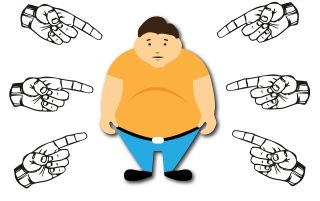KEY POINTS-
- Fat shaming has been one of the most common forms of bullying.
- Turning to the school for help often doesn't help, so kids despair.
- While excess weight and shaming often go together, they are really two separate issues.
- Kids can be taught how to stop others from fat shaming them almost instantaneously.

Trigger Warning: See bottom of the article.
Do you have an overweight child who’s being bullied? Have you followed the universally offered advice to inform the school, only to find that the problem has continued and even escalated? If so, you are not alone. You may have come to believe the problem is intractable, but the solution may be simpler than you’ve imagined.
The problem of fat-shaming
Body shaming is certainly one of the most common forms of bullying. The incessant promotion of the ideal of thinness and the simultaneous growing epidemic of obesity have combined to make weight the most common target of body shaming.
Why is bullying, including fat shaming, continuing to be called an epidemic despite more than two decades of anti-bullying efforts by society? It’s because these efforts are predominantly directed to encouraging kids to stop bullying others. But if your child needs to wait for others to change, they may continue suffering indefinitely. Fortunately, the person best positioned to get your child to stop being bullied is none other than your child.
First, to help your child, it is important to have realistic expectations.
- We can’t prevent others from noticing our differences and imperfections. Stop expecting others not to notice that your child is overweight. It’s going to happen whether we like it or not.
- It is impossible to prevent any given individual from insulting your child once. It can be devastating for a child to be ridiculed by schoolmates day after day. It is precisely this destructive, repetitive victimization that your child needs to–and can–prevent.
- As much as we hate being shamed, it has a positive biological purpose. Shaming is a universal behavior that goes on in every society in the world. It’s nature’s way of getting us to improve. We're shaming bullies today to pressure them to stop being mean. And when kids shame others for being fat, they are engaging in hard-wired socio-biological behavior intended to push their peers to become healthier and better-looking. In fact, there is a good chance even you have been encouraging your child to slim down. Pressure by peers can be more effective than all the lectures from Mom and Dad. The news is replete with stories of people who got into shape in response to fat shaming. A prime example is Superman actor Henry Cavill, who was called Fat Cavill in school. So, instead of being mad about it, accept and appreciate it.
Two separate issues
If your child is being fat-shamed, there are two separate issues. One is how your child feels about being overweight. The second issue is the fat shaming. These two issues often go together, but they don’t necessarily.
Kids who are bullied about their weight mistakenly believe they are bullied because they are overweight. But the real reason is because they get upset when they’re bullied for being overweight. If they wouldn’t get upset, it would be no fun to pick on them, and the kids would leave them alone.
There are kids who feel bad for being overweight and wish they were thinner, but they don’t get bullied because they don’t get upset when picked on. They may even be popular because they're enjoyable to be with. Some incredibly popular people are obese.
If your child is upset because of obesity, see if they want your help in finding a solution. But if they are being fat-shamed, making it stop is their most urgent need, whether or not they want to reduce their weight. It can be accomplished in a matter of seconds.
The solution
The most effective way to deal with bullying is by employing the Golden Rule, which instructs us to be nice to people even when they are mean to us, or, in other words, to treat them like friends even when they treat us like enemies. It's against our nature, but it creates a win/win situation.
It works because people are biologically programmed for reciprocity. That’s why we feel like being nice to people when they’re nice to us and mean when they’re mean to us. But if I operate by reciprocity and am mean to you when you are mean to me, you will be mean to me again. If, instead, I’m nice to you when you’re mean to me, you’ll feel like being nice back. And my absolute favorite way of responding to an insult is with the opposite compliment, as I will demonstrate shortly.
The Technique
The most effective way to teach someone to handle bullying is through role-playing. Put your child in the role of the bully, and you play the victim. Do two takes. In the first one, get upset and treat them like an enemy. Then repeat the scenario, but stay calm and treat them like a friend.
Tell your child, “I’m going to teach you why kids make fun of your weight and how to get them to stop. Call me fat, and don’t let me stop you.” It should go something like the following.
Child: You’re so fat!
Parent: No, I’m not!
Child: Yes, you are! Just look in the mirror!
Parent: I’m not fat! I’m big-boned!
Child: It’s not your bones that are big! It’s all of you!
Parent: Stop it already! I am not fat!
Keep it up till it’s clear that you’re not getting your child to stop and that they’re having a good time seeing you getting upset. Then continue as follows:
Parent: Am I making you stop calling me fat?
Child: No.
Parent: Isn’t this fun for you?
Child: Yes.
Parent: Who’s winning?
Child: I am.
Parent: Now let’s do it again. Call me fat and don’t let me stop you.
Child: You’re so fat!
Parent: You’re so thin! That’s great!
Child: Thanks!
Parent: You’re welcome!
And that’s pretty much where it ends. If the child is persistent in insulting you, do as follows.
Child: You’re so fat!
Parent: You’re so thin! I wish I were like you!
Child: But you’re not. You’re still fat.
Parent: And you’re still skinny.
Child: And you’re still fat.
Parent: That’s right. And you’re still skinny.
The child should quickly run out of steam. Then continue:
Parent: This way, do you feel like calling me fat again?
Child: No.
Parent: And who’s winning?
Child: You are.
Parent: That’s right. You see, they’re not calling you fat because you’re overweight, but because you get upset when they call you fat. So, stay calm and tell them they’re thin, and you will see how quickly they stop insulting you. They’ll even appreciate you for complimenting them.
There are other responses that also work nicely, and you can act them out with your child. The following is highly effective. It goes as follows.
Child: You’re so fat!
Parent: You just noticed?
Your child will probably laugh, and have nothing more to say.
Sometimes, fat shaming is combined with a remark about physical acumen, such as, "You can't play ball with us because you run too slow." Kids can be taught to respond with, "I wish I could run as fast as you. But you'll see I play pretty well anyway." If it's said confidently, there's a good chance they'll be allowed to join the game, especially if players are needed.
For good measure, give your child practice. Have them play the victim while you insult them, and instruct them to respond in a friendly way. If they succeed in doing it smoothly with you, they’ll probably be able to do it with other kids.
Good luck!


